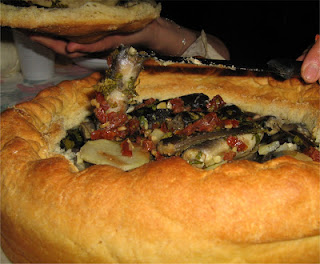Mangiare in eccesso? Disturba il nostro orologio alimentare.
La cena natalizia troppo abbondante? Altera l'orologio alimentare che si trova dentro di noi. Un raffinato sistema di controllo gestito da un insieme di geni ancora poco conosciuto. Un recentissimo studio, condotto da ricercatori della University of California, San Francisco (UCSF), pubblicato questo mese sui Proceedings of the National Academy of Sciences, rivela come funziona questo nostro orologio (Food Clock) a livello molecolare. I risultati della ricerca potrebbero avere implicazioni rilevanti nella comprensione delle basi molecolari di diabete, obesità e altre sindromi metaboliche.
Comprendere il meccanismo molecolare connesso con il mangiare in eccesso potrebbe aiutare a migliorare dei disordini associati con il jet lag e con la sindrome del divoratore notturno (Night eating syndrome).
What Ptacek e i suoi colleghi hanno scoperto che alla base del fenomeno ci sono le proteine PKCγ e BMAL.
PKC participates in food entrainment by regulating BMAL1.
Proceedings of the National Academy of Sciences, 2012; 109 (50): 20679
DOI: 10.1073/pnas.1218699110
Abstract
Temporally restricted feeding (RF) can phase reset the circadian clocks in numerous tissues in mammals, contributing to altered timing of behavioral and physiological rhythms. However, little is known regarding the underlying molecular mechanism. Here we demonstrate a role for the gamma isotype of protein kinase C (PKCγ) in food-mediated entrainment of behavior and the molecular clock. We found that daytime RF reduced late-night activity in wild-type mice but not mice homozygous for a null mutation of PKCγ (PKCγ−/−). Molecular analysis revealed that PKCγ exhibited RF-induced changes in activation patterns in the cerebral cortex and that RF failed to substantially phase shift the oscillation of clock gene transcripts in the absence of PKCγ. PKCγ exerts effects on the clock, at least in part, by stabilizing the core clock component brain and muscle aryl hydrocarbon receptor nuclear translocator like 1 (BMAL1) and reducing its ubiquitylation in a deubiquitination-dependent manner. Taken together, these results suggest that PKCγ plays a role in food entrainment by regulating BMAL1 stability.
Comprendere il meccanismo molecolare connesso con il mangiare in eccesso potrebbe aiutare a migliorare dei disordini associati con il jet lag e con la sindrome del divoratore notturno (Night eating syndrome).
What Ptacek e i suoi colleghi hanno scoperto che alla base del fenomeno ci sono le proteine PKCγ e BMAL.
Andrea Mameli www.linguaggiomacchina.it 25 Dicembre 2012
Foto: Panada di anguille (2007)
L. Zhang, D. Abraham, S.-T. Lin, H. Oster, G. Eichele, Y.-H. Fu, L. J. Ptacek.PKC participates in food entrainment by regulating BMAL1.
Proceedings of the National Academy of Sciences, 2012; 109 (50): 20679
DOI: 10.1073/pnas.1218699110
Abstract
Temporally restricted feeding (RF) can phase reset the circadian clocks in numerous tissues in mammals, contributing to altered timing of behavioral and physiological rhythms. However, little is known regarding the underlying molecular mechanism. Here we demonstrate a role for the gamma isotype of protein kinase C (PKCγ) in food-mediated entrainment of behavior and the molecular clock. We found that daytime RF reduced late-night activity in wild-type mice but not mice homozygous for a null mutation of PKCγ (PKCγ−/−). Molecular analysis revealed that PKCγ exhibited RF-induced changes in activation patterns in the cerebral cortex and that RF failed to substantially phase shift the oscillation of clock gene transcripts in the absence of PKCγ. PKCγ exerts effects on the clock, at least in part, by stabilizing the core clock component brain and muscle aryl hydrocarbon receptor nuclear translocator like 1 (BMAL1) and reducing its ubiquitylation in a deubiquitination-dependent manner. Taken together, these results suggest that PKCγ plays a role in food entrainment by regulating BMAL1 stability.




Commenti